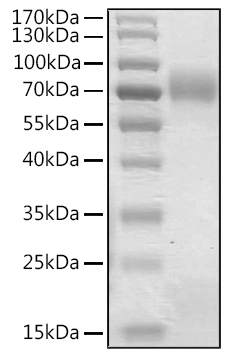Description
Recombinant Human Angiopoietin-like 8/ANGPTL8 (22-198) Protein
The Recombinant Human Angiopoietin-like 8/ANGPTL8 (22-198) Protein is a biologically active recombinant protein that plays a significant role in various cellular processes and signaling pathways in human biology. This protein is widely employed in immunological research, cell biology studies, protein-protein interaction analyses, and therapeutic development, providing researchers with a reliable tool for investigating Angiopoietin-like 8/ANGPTL8 (22-198) function and its implications in health and disease.
This product (SKU: RPCB1762) is produced using HEK293 cells and features a N-hFC tag for convenient detection and purification. The protein exhibits a calculated molecular weight of 46 kDa with an observed molecular weight of 54 kDa under denaturing conditions, achieving ≥ 80 % as determined by SDS-PAGE., ensuring exceptional quality and consistency for research applications.
Key Features
| High Purity by Affinity Chromatography | |
| Mammalian & Bacterial Expression Systems | |
| High lot-to-lot consistency via strict QC |
| Product Name: | Recombinant Human Angiopoietin-like 8/ANGPTL8 (22-198) Protein |
| SKU: | RPCB1762 |
| Size: | 10 μg , 50 μg |
| Reactivity: | Human |
| Synonyms: | Betatrophin, Angiopoietin-like protein 8, Lipasin, Angptl8, ANGPTL8 |
| Tag: | N-hFC |
| Expression Host: | HEK293 cells |
| Calculated MW: | 46 kDa |
| Observed MW: | 54 kDa |
| Gene ID: | 55908 |
| Protein Description: | High quality, high purity and low endotoxin recombinant Recombinant Human Angiopoietin-like 8/ANGPTL8 (22-198) Protein (RPCB1762), tested reactivity in HEK293 cells and has been validated in SDS-PAGE.100% guaranteed. |
| Endotoxin: | < 1 EU/μg of the protein by LAL method. |
| Purity: | ≥ 80 % as determined by SDS-PAGE. |
| Formulation: | Lyophilized from a 0.22 μm filtered solution of 20mM PB, 150mM NaCl, pH 7.4. |
| Reconstitution: | Centrifuge the tube before opening. Reconstitute to a concentration of 0.1-0.5 mg/mL in sterile distilled water. Avoid vortex or vigorously pipetting the protein. For long term storage, it is recommended to add a carrier protein or stablizer (e.g. 0.1% BSA, 5% HSA, 10% FBS or 5% Trehalose), and aliquot the reconstituted protein solution to minimize free-thaw cycles. |
| Storage: | Store at -20℃.Store the lyophilized protein at -20℃ to -80 ℃ up to 1 year from the date of receipt. After reconstitution, the protein solution is stable at -20℃ for 3 months, at 2-8℃ for up to 1 week. |
The protein specifically promotes pancreatic beta cell proliferation and beta cell mass expansion, thereby improving glucose tolerance. It promotes pancreatic beta cell proliferation without insulin resistance. Also it acts as a blood lipid regulator by regulating serum triglyceride levels and possibly by promoting ANGPTL3 cleavage. It interacts with ANGPTL3. It predominantly expressed in liver and also expressed in adipose tissues. The ability of the protein to induce pancreatic beta cell proliferation is promising in diabetes therapy. Betatrophin treatment could supply or replace insulin injections by increasing the number of insulin-producing cells in diabetes.







